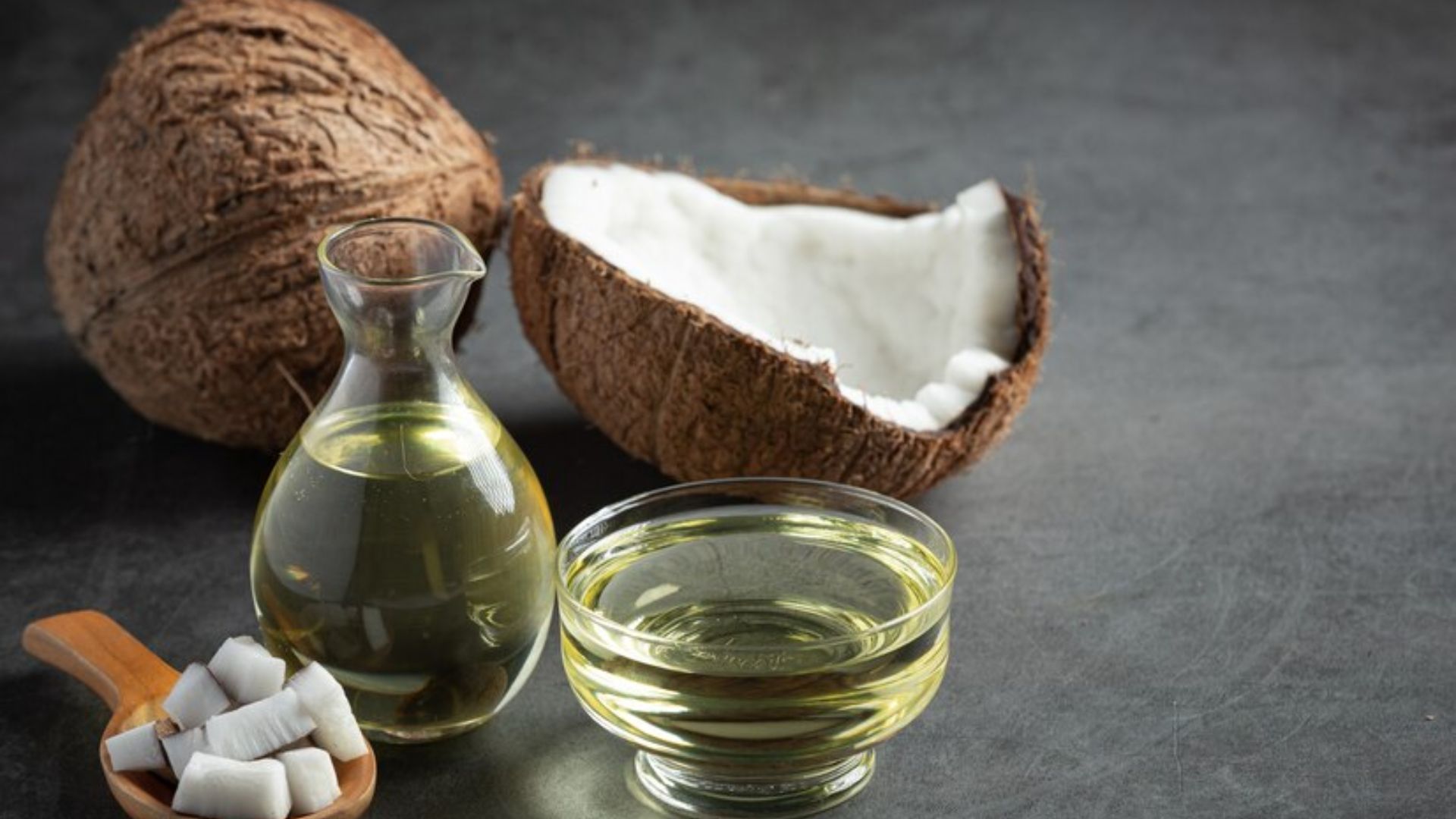Can Coconut Oil Help with UTIs? Benefits and Risks Explored

Coconut Oil and UTIs

Urinary tract infections, or UTIs, are a common woe, especially for women. They occur when bacteria invade the urinary tract, causing irritation and inflammation. Symptoms can include:
- A burning sensation during urination
- Frequent urination, even at night
- Urgent need to urinate (even if there’s little urine)
- Pelvic pain
- Cloudy or bloody urine
With the discomfort UTIs bring, it’s no wonder many people seek natural remedies. Coconut oil, in particular, has gained interest for its potential antibacterial properties.
Also Read: Natural Remedies for Health
How to Use Coconut Oil for UTIs
While coconut oil is a popular natural remedy, there’s limited scientific evidence to support its effectiveness against UTIs. Here’s what you need to consider:
Safe Uses:
- Topical Relief: Coconut oil can soothe external discomfort like burning during urination. Apply a small amount directly to the genital area, but be cautious – UTIs are internal, and topical application won’t reach the source of the infection. Do a patch test first to check for allergies.
- Dietary Support: Including coconut oil in your diet might indirectly help UTIs. It may boost your immune system, which can aid in fighting infection. However, there’s no recommended dosage for UTI treatment with coconut oil.
Important Considerations:
- No Replacement for Medical Attention: Coconut oil is not a cure for UTIs. If you suspect a UTI, see a doctor. Early diagnosis and antibiotics are crucial to prevent complications.
- Dosage and Moderation: While generally safe, excessive coconut oil intake can cause digestive issues. Talk to your doctor before incorporating large amounts into your diet.
Alternative Approaches:
- Hydration is Key: Drinking plenty of fluids helps flush out bacteria. Aim for 8-10 glasses of water daily.
- Cranberry Power: Cranberry juice may help prevent UTIs by hindering bacteria from sticking to the bladder wall.
Remember, coconut oil can be a safe addition to your routine, but it shouldn’t replace seeking medical attention for a UTI.
Benefits of Coconut Oil for UTIs
While coconut oil’s effectiveness against UTIs lacks strong scientific backing, there are potential benefits to consider:
Antimicrobial Potential: Coconut oil contains lauric acid, a fatty acid with some evidence of fighting bacteria and viruses. However, more research is needed to confirm its effectiveness against UTI-causing bacteria specifically.
Immune System Support: A healthy immune system is better equipped to fight infections. Some studies suggest coconut oil may offer immune-boosting properties, but further research is needed to solidify this connection with UTIs.
Preventing Recurrent UTIs:
While not a direct treatment, coconut oil might play a supporting role:
Improved Gut Health: A healthy gut microbiome may help prevent bad bacteria from causing UTIs. Some studies suggest coconut oil may promote beneficial gut flora, but more research is needed.
The Takeaway: A Balanced Approach
Coconut oil might offer some indirect benefits for UTIs, but a balanced approach is key:
- Lifestyle Habits: Maintain good hygiene, drink plenty of fluids, and wear loose cotton underwear. These habits can significantly reduce your risk of UTIs.
- Doctor First: If you suspect a UTI, see a doctor for diagnosis and treatment. Early intervention is essential to avoid complications.
Remember, coconut oil is a complementary approach, not a replacement for medical advice.
Also Read: Health Risks and Precautions
Risks of Using Coconut Oil for UTIs
While coconut oil is generally safe, using it for UTIs comes with some potential downsides:
Allergic Reactions: Coconut allergies are real. If you have a known coconut allergy, avoid coconut oil altogether. Symptoms of a coconut allergy can range from mild skin irritation to life-threatening anaphylaxis.
Skin Irritation: Even without an allergy, coconut oil can irritate some people’s skin. Do a patch test on your forearm before applying it to the genital area.
Digestive Issues: Excessive coconut oil intake can cause diarrhea, nausea, and stomach cramps, especially for those not accustomed to it.
Risky Practices to Avoid:
Internal Application: There’s no scientific evidence to support the effectiveness of inserting coconut oil vaginally for UTIs. In fact, it may disrupt the natural vaginal flora and worsen symptoms.
Delaying Medical Attention: UTIs left untreated can lead to serious complications. If you suspect a UTI, see a doctor promptly. Antibiotics are the most effective course of treatment.
Remember: Coconut oil should not be used internally for UTIs.
Coconut oil is best used as a complementary approach, not a substitute for medical care. If you’re considering using it, talk to your doctor first, especially if you have any underlying health conditions.
Scientific Evidence for Coconut Oil and UTIs
The exciting potential of coconut oil against UTIs hasn’t yet been solidified by robust scientific evidence. Here’s a breakdown of the current situation:
Limited Studies: There’s currently no direct research on the effectiveness of coconut oil in treating or preventing UTIs.
Indirect Evidence: Some studies suggest coconut oil’s lauric acid might possess antimicrobial properties. However, these studies haven’t specifically tested its effectiveness against UTI-causing bacteria.
Gaps in Knowledge: More research is needed to explore coconut oil’s potential impact on UTIs, including its effect on gut health and immune function in relation to UTI prevention.
The Need for More Evidence:
While anecdotal reports of coconut oil success exist, scientific studies are crucial to establish its effectiveness and safety for UTIs.
Moving Forward:
Future research on coconut oil and UTIs could involve:
Clinical trials: Testing the effectiveness of coconut oil against UTIs compared to a placebo in controlled settings.
Mechanism studies: Investigating how coconut oil might influence factors like gut health and immune function, potentially impacting UTI risk.
The message is clear: More research is needed before recommending coconut oil as a standalone treatment for UTIs.
Also Read: Natural Superfoods and Detox
In Crux
UTIs can be a real drag, and the search for relief is understandable. While coconut oil has garnered interest for its potential benefits.
Explore natural approaches like coconut oil, but always discuss them with your doctor. They can help you create a comprehensive plan that addresses the root cause of your UTIs while keeping you safe and healthy.
Remember, coconut oil is a complementary approach, not a replacement for medical advice. By working with your doctor, you can find the most effective strategies to keep UTIs at bay and maintain a healthy urinary tract.
How much did you like Our detailed Coconut Oil? Please share your view in the comment box. Also, please share these Blogs with your friends on social media.
Recommended
RELATED ARTICLES

Buspar and Alcohol Interaction

Ubrelvy Side Effects: Risks and Benefits

How Swimming Strengthens Abs

Best Nutrition Guide for Runners

Understanding Suprapubic Pain

How to Stay Healthy on a Road Trip

Benefits of Omega-3 Fatty Acids

How to fast healthy during Navratri









